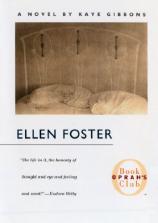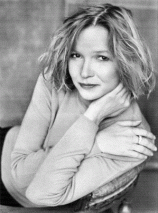Reading Group Guide
Discussion Questions
Ellen Foster

1. Ellen is searching for a home. How does she define home at the beginning of the novel, and how does she refine her definition during the course of the narrative? What examples of family life and of parenthood has she had to guide her? How do the various parents she observes measure up? What message does Ellen receive during the course of the book about parents and parenthood? Is Gibbons's point that, in the end, family members are unreliable? That one can rely on no one but oneself?
2. Ellen is a person who is inclined to make lists; she is very concerned with order. What attempts does she make to introduce order into her own life? What is the source of this need for order and what light does it shed on Ellen's personality? How does this character trait relate to Ellen's instinct for survival? How does the theme of control and personal responsibility come up in relation to the novel's other characters? How does it relate to the deaths of Ellen's mother and grandmother?
3. Why have none of the concerned adults in Ellen's life--her teachers, Starletta's parents, Julia and Roy, Mavis--been able to rescue her from the dreadful and dangerous life she leads within her own family? How does this failure reflect upon the nature of Ellen's society? What is it about the life even of a small and interconnected community that keeps people from being able to help a desperate child? Is the legal system at fault? The social one?
4. "People say they do not try to be white" [p. 29], Ellen says about Starletta's parents. What does this tell us about them and about the society they live in? What does Ellen's initial description of Starletta's home reveal about Ellen herself? What details in her narrative expose her assumptions about black people? By extension, what do they show about her own vision of herself and her family? How do these assumptions change, and what causes them to do so? How does Ellen's observation of Mavis and her family contribute to her changing attitudes? Ellen's grandmother said she would learn something from picking cotton. What, in fact, does she learn?
5. "Nobody but a handful of folks I know pays attention to rules about how you treat somebody anyway," Ellen reflects. "But as I lay in that bed and watch my Starletta fall asleep I figure that if they could fight a war over how I'm supposed to think about her then I'm obligated to do it" [p. 126]. What discovery has Ellen made here? Why is Starletta's weekend visit so significant to Ellen? Do you think the author is saying that Ellen is now a person without prejudice?
6. The South's violent history of slavery, war, and racial hatred is the unstated background for this story. How does Gibbons make us aware of its silent presence? To what degree is Ellen herself aware of it? Is the contemporary black experience as she observes it still based upon the fact of slavery, paid or unpaid? What is Ellen's way of personally coping with this tragic history?
7. The judge who awarded Ellen's custody to her grandmother expresses the common idea that a child should be with her own family, but Ellen objects. "What do you do when the judge talks about the family society's cornerstone but you know yours was never a Roman pillar but is and always has been a crumbly old brick?" [p. 56] she asks herself. Does Gibbons imply that a child's being with its biological family is not, after all, that important? Which is more important, the family you choose or the family you are born into?
8. Ellen does not believe in the church's version of God. "Chickenshit is what I would say" [p. 96], she says of Nadine's version of Heaven. But she does have her own version of God, and speaks to him on occasion. What sort of relationship does she have with the deity? What kind of deity is he--fair or strict? Accessible or inaccessible? Forgiving or unforgiving? How much of his character derives from the traditional God about whom the church has taught her?
9. The society around Ellen--particularly her mother's family--tries to make her feel guilty about many of her actions, even, in the case of her mama's mama, about her very existence. To what degree does Ellen share the feeling that she herself is guilty? Are the acts she feels guilty about the same ones she is blamed for by the people around her? She seems deeply concerned with the idea of personal atonement. What are her feelings about atonement and how does she herself atone by the end of the novel?
10. Money and the good and bad effects of having it or not having it are a recurring issue in Ellen Foster. Ellen baldly states, "All I really cared about accumulating was money. I saved a bundle" [p. 61]. In the book, economic status is often integrated into character descriptions or included in the rationale for characters' actions. How does Gibbons depict money as a force in people's lives? Is money, in and of itself, deemed to be either good or evil?
11. In Ellen Foster, Kaye Gibbons has chosen not to use quotation marks for dialogue. Look at passages like the ones on pages 32; 47 and 48; and 112. How do you know who is speaking? Are we listening only to Ellen, or listening in on a private conversation? How does the author's decision not to use quotation marks affect the reading experience?
12. "Dora, let me tell you a thing or two," Ellen says. "There is no Santa Claus" [p. 107]. Yet, on Christmas Eve, Ellen longs to hear something landing on the roof. Having been deprived of her own childhood illusions, she hates Dora for retaining all of hers, but in spite of Starletta's happy Christmas and her toys, Ellen does not hate Starletta. What is the difference between Dora's and Starletta's innocent belief in Santa Claus? What does the Christmas scene as a whole say about the characters of Dora and Nadine? What does it say about family, childhood, innocence, and celebration?
13. What does Ellen's encounter with the school psychiatrist tell us about Ellen? What does it tell us about the psychiatrist and the kind of therapy he practices? How effective is the therapy as a tool for dealing with children like Ellen? Is it the psychiatrist's personal defects that keep it from working with Ellen, or would it be equally ineffective no matter who the practitioner was?
14. Two of the primary metaphors that recur throughout the novel are the magician and the microscope. What do you think each symbolizes? Who is the magician? How do his "appearances" after the deaths of Ellen's mother and father affect her internalization of the events? Why does the novel's diction change so markedly during these passages?
15. Why has Gibbons chosen the quotation from Emerson's Self-Reliance to begin her novel? How does the quotation relate to the text, to the character of Ellen, and to Gibbons's stated and implied themes? What has the novel itself to say about the attribute of self-reliance? Do you find that the novel's focus upon that quality places it within a particular tradition of American literature? What other American novels does Ellen Foster echo? If you have read Mark Twain's Huckleberry Finn, can you compare the two novels? Would it be fair to say that Ellen Foster is a female version of that very masculine story? How does the concept of "self-reliance" mold both books?
Ellen Foster
- Publication Date: January 12, 1987
- Hardcover: 168 pages
- Publisher: Algonquin Books
- ISBN-10: 1565122054
- ISBN-13: 9781565122055








